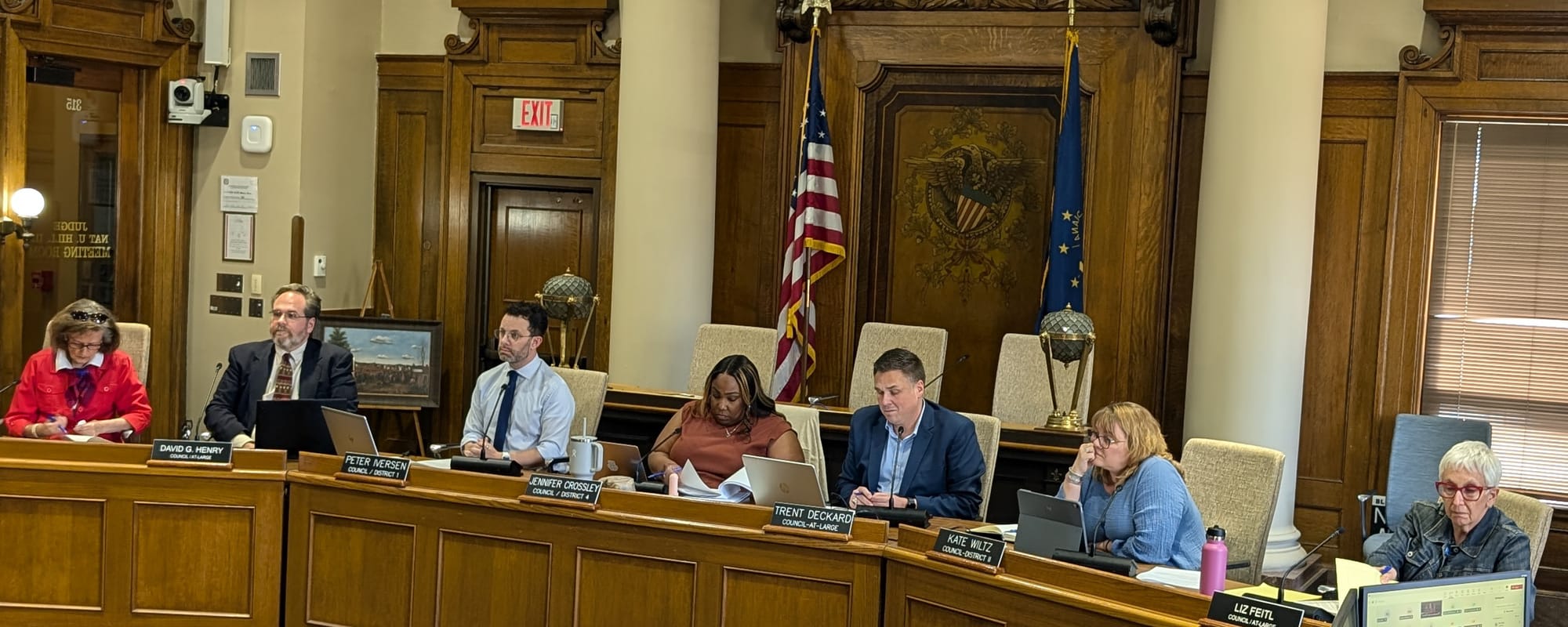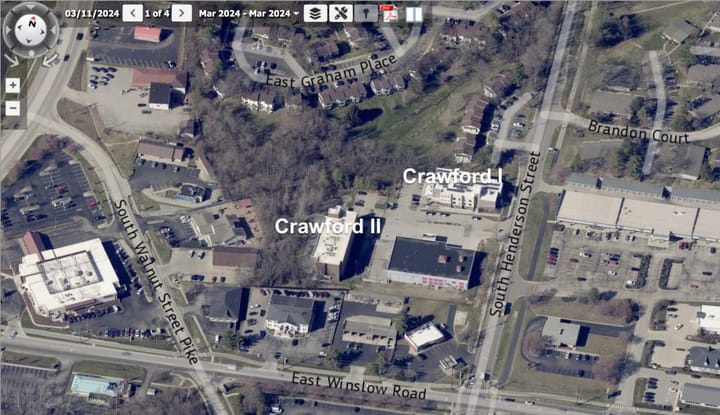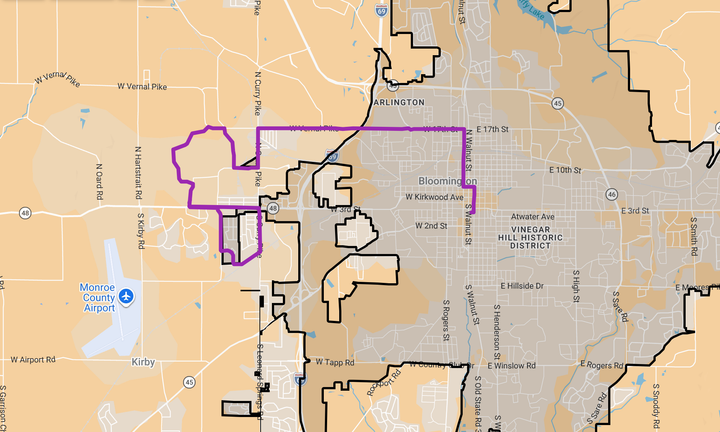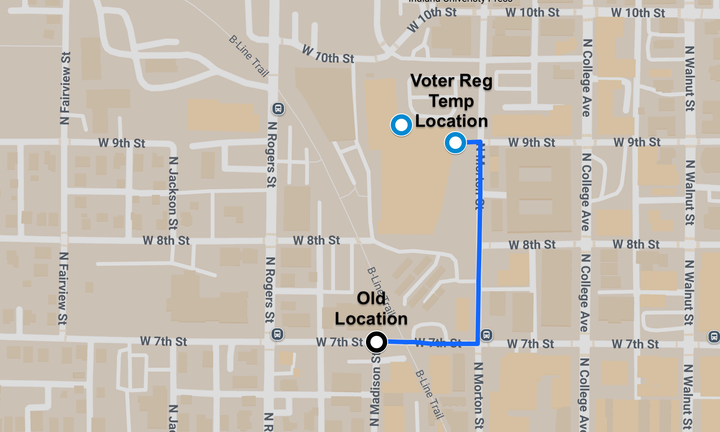Monroe County reverses course, nixes higher pay for health services director



In the left hand photo is Monroe County health administrator Lori Kelley. In the right hand photo are Monroe County councilors (from left): Marty Hawk, David Henry, Peter Iversen, Jennifer Crossley, Trent Deckard, Kate Wiltz, and Liz Feitl. (April 22, 2025))
On Tuesday night, a request from Monroe County's health administrator Lori Kelley to change the job classification of the department's health services director from a lower classification (PAT D) to a higher one (EXE A) failed on a 2–5 vote.
Voting in favor were Trent Deckard and Kate Wiltz.
It was the second time in as many meetings that the council had voted on the same job reclassification. At its previous meeting, on April 8, the council's vote was 4–3 in favor, with Liz Feitl and council president Jennifer Crossley joining Deckard and Wiltz in support of the reclassification. Voting against the change at both meetings were: Marty Hawk; David Henry; and Peter Iversen.
Because the reclassification meant a change to the salary ordinance, and the vote was not unanimous on its initial consideration, a second vote at a following meeting was required.
The recommendation from Monroe County's human resources consulting firm, Waggoner, Irwin, Scheele & Associates (WIS), was to keep the classification the same—at PAT D, which is the highest tier of the PAT (Professional, Administrative, Technological) job classification. Another factor that led councilors to vote against the change was the generally severe fiscal climate that all local government units will be facing in the next few years because of action by Indiana's General Assembly in this year's session.
A big change to property tax law in Indiana was recently signed into law by Indiana governor Mike Braun (SB 1). The impact of SB 1 on Monroe County government property tax revenues will be about $8.1 million less over three years, from 2026 through 2028. For each year, the projected revenue decrease compared to the baseline, if the property tax law had not changed will be: -$1,910,410 (2026); -$2,601,090 (2027); and -$3,592,950 (2028).
At 35 hours a week, the county's salary grid calls for PAT D positions to be paid in a range from $57,458 to $72,782. The requested 40-hour a week position for the classification EXE A, which is the lowest tier of the EXE (Executive) classification, pays in a range of $75,213 to $95,264.
Facing questions from county councilors about the availability of funding through HFI (Health First Indiana), Kelley pled with them: "I want this council to trust me, that I can figure this out." She continued, "One way or another, we got this." She added, "We can move things around and I think that was the intention with the state, that we can tailor these budgets how our community needs the services to be provided." Kelley also stated, "We have to have these positions. We have to be providing these services. We are covering 16 counties, and we only have two employees right now covering those services."
Part of the request from Kelley had included a change in the work time from 35 to 40 hours a week. Two weeks ago, Peter Iversen indicated he would support increasing the hours for the position from 35 to 40 hours a week, but not the change in job classification. Bumping the work time from 35 to 40 hours is a tactic the council sometimes uses to increase compensation for Monroe County employees, without changing the classification. On Tuesday, councilors did not take up the question of just changing the number of hours.
The newly created job is vacant. Kelley confirmed to The B Square after Tuesday's meeting that she would post the position with the PAT D classification at 35 hours a week, saying, "It's the only option we have."
The position is designed to oversee eight full-time employees who handle a range of health areas, including: maternal and child health; chronic disease; trauma and injury prevention; access and linkage to care; harm reduction programming; tobacco and vaping prevention and cessation; fatality review; and infectious disease prevention and control.
The position also oversees disease intervention services of medication administration and medication inventory, ensures compliance with HIPAA regulations, ensures compliance with standing orders and medical procedures, and serves as the county health department's HIPAA privacy officer.
When the job was posted late last year, it drew few applicants. That's part of the reason Kelley asked the council to reclassify the position. She chalked up the shallow applicant pool to the level of the compensation.
A couple of counterpoints, from the dais and from the public mic, were offered to the idea that the level of compensation was to blame for the lack of robust response from applicants. Councilor Marty Hawk told Kelley it's "not unusual" that fewer applicants respond to a job posting around Christmas time. Hawk expressed disappointment that the job had not been advertised again.
During public commentary, Christine Brackenhoff, a former health department employee, said, "I doubt that salary is the deterring factor for…applicants." The position itself, Brackenhoff said, "sounds like a unicorn" because it's an administrator, who is also a nurse who provides clinical services—and oversees employees who cover a wide range of services like child health, harm reduction, tobacco cessation, disease intervention and more.
Brackenhoff was the last licensed practical nurse to work at the county's Futures Family Planning Clinic, which lost its grant funding last year.
Brackenhoff, along with some other former employees of the Futures Clinic, and former county board of health member Ashley Cranor, addressed the board of health at its meeting last Thursday, recounting their negative experiences in the waning days of the clinic. Board members responded to the commentary at the end of their Thursday meeting. Stephen Pritchard said, "I am sorry that some employees feel that they were unfairly treated. I'm not convinced that that is the case." Pritchard also pointed out that after an interruption in services, the entity that had been providing the grant funding for Futures, Indiana Family Health Council, had begun offering services in the Bloomington area.
At Tuesday's council meeting, Brackenhoff said that "the elephant in the room" is what she described as "the high turnover and low morale" under Kelley's administration of the health department. At last Thursday's board of health meeting, county councilor David Henry also weighed in from the public mic, telling the board that the council would be reviewing the health service director role at the next county council meeting.
Henry said, "Based on some of the comments I've heard today about the Futures Clinic, we really need to…close up this conversation." Henry noted that the health services director role was at one point contemplated as merging with a position that would have overseen the Futures Clinic. Henry said, "I think it's probably time for the board to consider releasing all the notes it has regarding the Futures Clinic closure."
Henry added, "There are documents that have been redacted that should perhaps shed more light on what we're hearing here…" Henry said, "It is not lost on me that a wound undressed will fester, and I gotta say I'd like to move forward as a community on this issue. I think we can do that together if we finally see some of the additional notes come to light."
[Through a formal records request, The B Square has obtained some meeting notes that amount to a kind of after action report on the closure of the Futures Clinic. Any B Square reporting on the meeting notes, and other concerns about the Futures Family Planning Clinic, will be separate from this article.]
On Tuesday, when he explained why he was sticking to his vote against the reclassification, Henry cited the inequity that would result within Kelley's own department, not to mention across the other departments in county government. Henry pointed out that even if Indiana's governor does not watch Monroe County council meetings, that county employees do, and the council has to be mindful of that audience.
Henry noted that the health department previously had a deputy administrator at an EXE level—a position held by Penny Caudill before she was elevated to health administrator. Caudill was Kelley's predecessor as health administrator. About the deputy administrator role, Henry said, "Maybe that's the position we need to reinvent and bring back," Henry said.
Standing by his previous vote in favor of the reclassification was Trent Deckard, who pointed to Indiana's low ranking compared to other states on health metrics. "I believe that our health department's got to punch its way out of that," Deckard said.
One of the swing votes that tipped the balance the other way against the reclassification was cast by county council president Jennifer Crossley. On Tuesday, she agreed with the idea that employees in other departments were watching the council's actions and that the councilors needed to be consistent in how they considered the WIS recommendations.
Crossley stated, "I hope that when we are having this type of conversation again, when another department comes to us, I also will task my council colleagues to say the hard things that we're saying right now to other upcoming departments when they come to us." Crossley said, "I was a yes vote a couple of weeks ago, and I am going to vote no tonight."





Comments ()